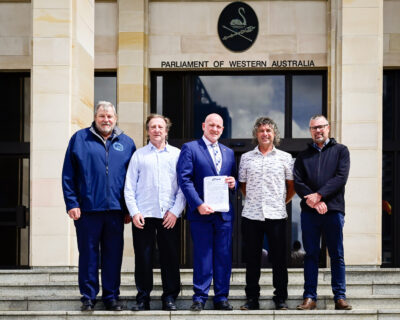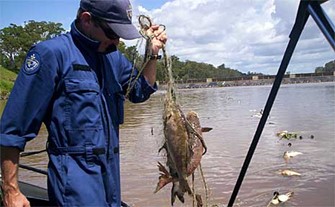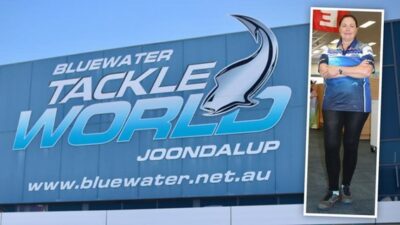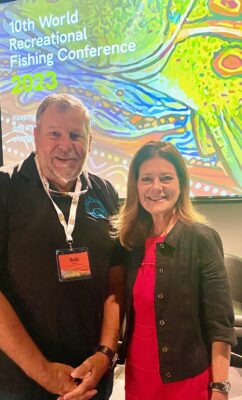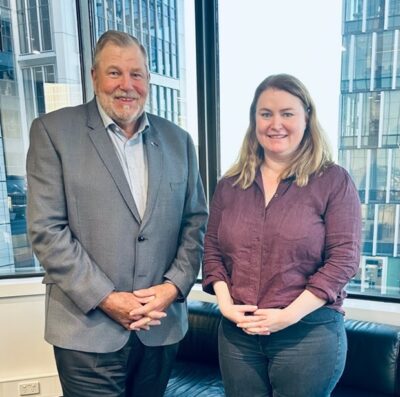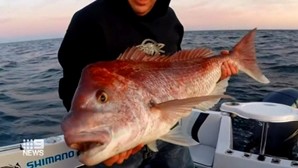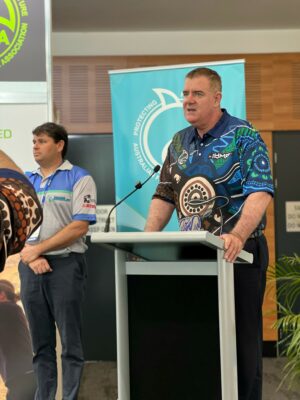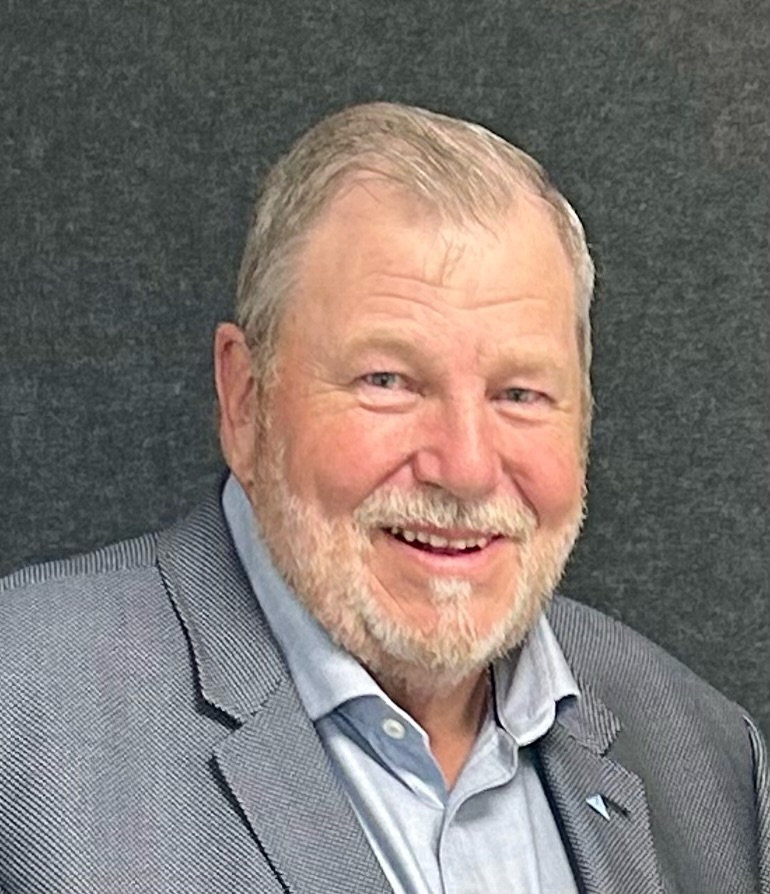
“Only with consistent effort can we, as an industry, battle with those who wish to restrict our rights to fish even more so when the very science they rely on is fundamentally floored.”
AFTA Annual Chair’s Report – July 2023
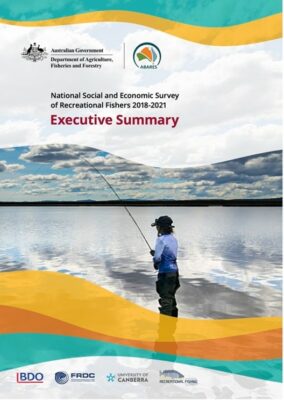 Just when you thought it was safe to come out of the woods after COVID, our industry has been whacked by various state government fishing regulations that, in some cases, make it near impossible to continue to trade.
Just when you thought it was safe to come out of the woods after COVID, our industry has been whacked by various state government fishing regulations that, in some cases, make it near impossible to continue to trade.
Despite that, our industry has seen overall growth over the past 12 months, and the positive reports in the National Social & Economic Survey of Recreational Fishers 2018-21 support that.
With over 100,000 people employed, generating over $11 billion of economic GDP contribution, our industry, along with the 4,200,000 participants (21%) in recreational fishing, has something to be rightly proud of.
We have an interesting year ahead in 2024 with elections in the Northern Territory (24 August 24), ACT (19 October 24) and Queensland (26 October 24), and whilst they occur after the 2024 AFTA Trade Show & AGM, the groundwork research and representations on issues important to us needs to start now.
Only with consistent effort can we, as an industry, battle with those who wish to restrict our rights to fish, even more so when the very science they rely on is fundamentally floored.
AFTA Board Meetings
In the past year, AFTA has held 5 formal board meetings, 2 via Teams and 3 Face to Face:
AFTA Board Meetings Attendance 2022/2023
Michael Starkey – President – Frogleys Offshore (5)
Billy Parsons – Vice President – JM Gillies (5)
Ben Scales – Treasurer & Secretary – Jarvis Walker (4)
Kord Luckus – Wilson Fishing (3)
Greg Seeto – Daiwa (5)
Steve Morgan – Fishing Monthly (3)
Alicia Bolitho – Tackle World (5)
Jarrod Day – Compleat Angler (4)
Cameron Jackson – BCF (3)
In addition, there have been various ad-hoc meetings with Fishery Ministers Don Punch (WA), Claire Scriven (SA), Sonia Kilkenny (Vic), Tara Moriarty (NSW), Dugald Saunders (NSW), Jo Campbell (TAS), all meetings were well attended by directors. For reports on these meetings, please read my previous monthly Chair Reports at https://afta.net.au/presidents-and-political-reports/.
I sincerely thank all board members for their input, be it at board meetings or working on the numerous issues we have been addressing throughout the year; their personal input and advice at all levels have been invaluable.
On a personal note, I thank West Australian AFTA members Tim Farnell, Brian Marshall, Compleat Angler Nedlands and Ash & Julie Ramm, Tackleworld Miami, for their dedication and tireless work on the WA Demersal Fishery issue, had it not been for their work the outcome would have been much, much worse.
Offshore Windfarms – The Impacts
Whether it is the sea we fish in or the air we breathe, we all want to see a much cleaner and healthier environment. Members may have differing opinions on the Government’s push towards Net Zero Emissions. Still, all are unified in opposition to Offshore Windfarms and the detrimental impacts on marine life, fishing, shipping, tourism, and aviation. Issues such as area exclusion zones, noise generation and electromagnetic impulses that affect migration patterns of fish, mammals and sea birds are not to be taken lightly.
The Commonwealth government has begun an expedited role out of proposed Offshore Windfarm leases around Australia. Whether it is the site at Port Macdonnell, SA, Port Stephens/Newcastle/Central Coast NSW, Wollongong/South Coast NSW, Warrnambool in Western Victoria or Wonthaggi and Port Albert in Victoria’s Gippsland region, the Bass Strait off Northern Tasmania, or the Indian Ocean region off Perth/Bunbury in Western Australia, all these are of significant concern to all sectors involved in fishing and tourism.
Please continue to monitor the AFTA website for impact statements and progress reports on this.
Queensland Spanish Mackerel
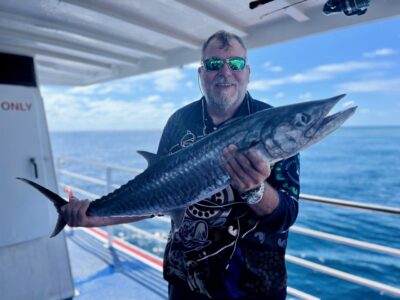 Whilst the split 6-week seasonal closures (North & South) for Spanish Mackerel came into effect last year, introducing a new bag limit for Spanish Mackerel of 1 fisher person and 2 per boat was applied from 1 July this year.
Whilst the split 6-week seasonal closures (North & South) for Spanish Mackerel came into effect last year, introducing a new bag limit for Spanish Mackerel of 1 fisher person and 2 per boat was applied from 1 July this year.
Whilst the 6-week split closures are not ideal, it is less impacting than the originally proposed 12-week closures. The northern seasonal closures run from October to November and November to December, with extract dates modified yearly based on the moon and spawning cycles. The southern seasonal closures are set dates and run from 1 February 2023 to 21 February 2023 and 1 March 2023 to 21 March 2023.
Through the efforts of AFTA Queensland Director Kord Luckus, we have kept the lines of communication open across members and government officials on this issue. AFTA will continue to work with the BIA & GFAA in monitoring the impacts and work towards improving access to the Spanish Mackerel industry over time.
Queensland – Gill Netting Closures – Common Sense in Action
AFTA congratulate the positive actions of Fishery Minister Mark Furner on the proposed changes announced in June for the full or partial removal of Gill or Mesh nets across northern Queensland. The plan will create net-free zones in the northern third of the Great Barrier Reef and parts of the Gulf of Carpentaria to better protect threatened species that move between the Reef and the Gulf.
There are substantial direct benefits to recreational anglers, tourism and our members and indirect benefits to businesses that supply and surround recreational fishing and the tackle trade.
For more detail, see: https://afta.net.au/tackling-the-risks-to-the-reef/
WA – the Demersal Cutbacks & the Casualties:
This year has seen the introduction of dramatic cutbacks in fishing for the demersal species of Dhufish and Pink Snapper, with extreme draconian management measures now in place in WA, unfairly biased against the recreational sector.It is distressing to see the end of the Harvey Family’s involvement in the WA recreational fishing trade. Liza Harvey has announced the difficult decision to close down both the Bluewater Tackle World Myaree and Joondalup stores. This is the end of an era brought on in part by the trading conditions in WA after the Government’s changes to access the fishery.
As Liza said: “I have appreciated the support received from our partners in the tackle trade and Tackle World over many years. As a founding member of Tackle World, this is a bittersweet decision – it will end my own 33-year journey as a fishing tackle retailer but also sees the end of a 91-year involvement of the Harvey family in the recreational fishing industry.”
And now there is the prospect of further closures and restrictions that will impact recreational fishers with the WA Government pushing ahead with a Marine Park agenda.
Victoria and the 10th World Recreational Fishing Conference & Ultimate Fishing Expo
In February, it was great to see Australian Recreational Fishing showcased at the 10th World Recreational Fishing Conference and the Ultimate Fishing Expo in Melbourne. I must extend congratulations to the organisers on an extremely well-run event.
At the conference, Sonya Kilkenny, Minister for Fishing & Boating, announced that the Target 1 million (T1) program would now be upgraded to Target 2 million (T2) recreational fishers for Victoria. In addition, the extremely successful “Women in Recreational Fishing” (WIRF) program has been redefined to “Women In Recreational Fishing & Boating” (WIRFAB) as a means of growing the industry through greater inclusion.
The Target One Million and the Women In Recreational Fishing program have been an outstanding success for the Government and, more importantly, our industry.
Congratulations are also due for getting work underway on delivering on the election promise to deliver the 60,000 fishing kits that will be made available to grade five primary students in more than 1,900 Victorian schools later this year. The 1.5 million dollar project will be a key part of growing our industry participation in the future as the Government implements its T2 program.
Undoubtedly, Victoria leads the way in recreational fisheries management and inclusion.
I thank AFTA Victorian Directors Billy Parsons, and Ben Scales, for local Victorian advice and support.
NSW
It can be rightly said that in NSW, the new Government will have big shoes to fill concerning recreational fishing, however following on from the recent meeting with the new Minster for Fishing, Tara Moriarty, it seems she is well up to the job to drive a positive agenda ahead.The Government is currently reviewing the best funding and governance models to establish a statutory Recreational Fishing industry body – RecFishNSW with a role to ensure that representation is fair, expert-based, independent and, in part, elected by recreational fishing licensees.
AFTA took the opportunity to promote our NSW “Let’s Go Fishing” Schools program and the “Let’s Fish NSW” social media and television ad campaigns, funded in part by the NSW Recreational Fishing Trust.
We discussed the Government’s drive to actively increase participation rates of women and people with a disability. We promoted the adoption of the Victorian Women in Recreational Fishing program as a strong model of positive inclusion.
The audit of public fishing infrastructure and amenities is welcomed to make fishing more accessible and welcoming for women and people with disabilities, and this will be closely monitored.
Tasmania
The AFTA board met with The Hon. Jo Campbell, Tasmanian Minister for Primary Industries, to discuss the impacts on our industry of the Tasmanian Scalefish Fishery Review. There are widespread concerns across our industry, not just in the Tasmanian stores but all the industry that supplies and supports the Tasmanian recreational fishing industry.
Whilst the interim measures on flathead are not ideal, they are tolerable; however, the review across so many species is an unconscionable action that undermines our industry’s viability.
AFTA commends Jane Gallichan, CEO TARFish, on their well-considered submission.
We appreciate the support & engagement from former AFTA member and now Tasmanian MP, The Hon. Nick Duigan MLC. Nick was a former host of the “Hook, Line & Sinker” show. It can make a difference just having someone who truly understands the whole industry at the political coalface.
The proposed amendments to the Fisheries (Scalefish) Rules 2015 apply to commercial, recreational, and Aboriginal fishing. It includes:
- reviewing size, bag and possession limits for depleted and depleting species for all fishers;
- introducing regional and statewide rules for depleted and depleting species;
- introducing two new commercial calamari licence types;
- reviewing recreational gillnetting arrangements; and
- introducing registration of charter fishing operations and reporting requirements.
South Australia
It was so disappointing that following on from the initial 3-year ban on Snapper; the South Australian Government decided to extend the ban on Snapper in the Spencer Gulf Fishing Zone, West Coast Fishing Zone and Gulf St Vincent/Kangaroo Island Fishing Zone for a further three years until 30 June 2026.AFTA met with new Minister Clare Scriven to question the snapper decision, and whilst not changing the decision, the Minister took onboard AFTA’s comments. This will be a work in progress.
AFTA also promoted the Women In Recreational Fishing programme based on the successful Victorian model to achieve greater inclusion, which was an ALP election commitment.
I truly appreciate AFTA’s SA representative, Alicia Bolitho (Tackle World, Port Lincoln) who worked tirelessly on Snapper and other state fishing issues representing AFTA. Thank you.
Commonwealth Government & FAD’s
The Federal Government, through the Great Barrier Reef Marine Parks Authority (GBRMPA), wants to ban FADs and Artificial Reefs on the Great Barrier Reef (GBR).
 The Federal Government, through the GBRMPA, commissioned a report: Fish Aggregating Devices and Artificial Reefs, Literature Review of Benefits and Negative Impacts for the Great Barrier Reef, which was the basis for consultation ahead of their draft policy formation.
The Federal Government, through the GBRMPA, commissioned a report: Fish Aggregating Devices and Artificial Reefs, Literature Review of Benefits and Negative Impacts for the Great Barrier Reef, which was the basis for consultation ahead of their draft policy formation.
Yet in their own GBRMPA policy document, the GBRMPA & Qld Government state at points:
“The Reef ecosystem is a biocultural ecosystem that includes humans. There are interdependencies of all components of the system (including humans and their complex cultural and spiritual values).
The main purpose of reef interventions in the Marine Parks must be to help directly support ecosystem recovery to build resilience and achieve conservation benefits as these underpin all other values.
As far as is consistent with this main purpose, the Managing Agencies encourage reef interventions that also provide secondary benefits to Indigenous and historic heritage, and social, biocultural and economic values of the Marine Parks. “
You don’t have to be a rocket scientist to understand that sustainability comes from increased stock levels for fishers to fish! FADs (Fish Attraction Devices), as the name so aptly and innocently suggests …. attract fish, particularly the travelling pelagic species.
FADs clearly deliver on the “triple bottom line”, a much-used phrase by politicians. The FADs deliver Social, Economic and Environmental benefits required by governments.
Grant Programs
AFTA has had continuing success in engaging in the various State Government Recreational Fishing Grant programs.
AFTA Tackle Show – Public Day
The Queensland Government, through the personal support of Fisheries Minister Mark Furner MP, generously provided $25,000 in sponsorship to make the AFTA Tackle Show Public Day a free entry event. This removes the price barrier to attendance, and we look forward to seeing an increased presence of families and young anglers at the show.In addition, the Victorian Government, through the VFA, have provided $10,000 sponsorship towards the show to promote the very successful Women In Recreational Fishing & Boating (WIRFAB) and how retailers can be more female-friendly to attract, support and increase female participation in our sport.
We look forward to Minister Mark Furner opening the AFTA Public Day at the Tackle Show, again this year.
Let’s Go Fishing – Educating School Children on the Sustainable Benefits of Recreational Fishing
AFTA appreciate the $115,000 continuing investment the NSW Government have in the “Let’s Fish NSW” Schools (Phase 5) program. This joint AFTA/NSW DPI Recreational Fishing Trust-funded program began in 2016, providing a hands-on education experience through the Marine Teachers Association. It has run across 127 NSW Schools, with more looking to be involved. I thank AFTA Directors Michael Starkey, Greg Seeto and former AFTA Director Mitch Birt for bringing this program together year after year.
“Let’s Fish Australia” Social Media Campaign
In the past, AFTA has had great success with grants from South Australia, Queensland & NSW for the program. AFTA is project managing and providing additional funding to get the program rolled out in a coordinated manner. Shortly you will see this campaign that targets not so much the existing committed fisher but those who may have dropped from the sport or have an interest in increasing or beginning participation across broad social and TV media.
The “Let’s Fish SA” social media clips have been rebranded to remove MRFAC and include the RecFish SA logos, and the Let’s Fish Qld” video campaigns have been released. They are available on the AFTA website, and the “Let’s Fish NSW” video campaign will be listed shortly.
It needs to be recognised that President Michael Starkey has been the driver for the development, production and overseeing of this important program.
Indigenous Youth Mobility Pathways – Recreational Fishing Cultural Exchange Program
This unique program, jointly funded by AFTA and the Qld Government Queensland Government through the QLD DAF fishing grants program, has now concluded Phase 2. This was a joint initiative of IYMP, the Queensland Government and AFTA working together to deliver tangible outcomes for remote indigenous youth.
AFTA contributed substantial time and money towards these two programs to help build our industry and meaningful reconciliations and engagement led by QLD Director Kord Luckus. I sincerely thank you, Kord, for your initiative and hard work; it has made a difference in the lives of so many.
For full details on all programs, please see: https://afta.net.au/projects/
In Summary
The AFTA directors, old and new, have each provided outstanding leadership, direction, and support through the many challenges over the past year. It’s not just about attending meetings but also about being available at the end of the phone when solid advice is needed. I sincerely say thank you for your efforts, but we have so much more to do.
On a personal note, I thank President Michael Starkey for his advice, personal commitment, and outstanding efforts in ensuring all programs are rolled out successfully and continue to perform.
I also wish to put on record my sincere appreciation for all the work Heatha Nicholas does with our communications and membership management.
So, Tight Lines & Full Tills, I look forward to seeing you at the show.
Bob
